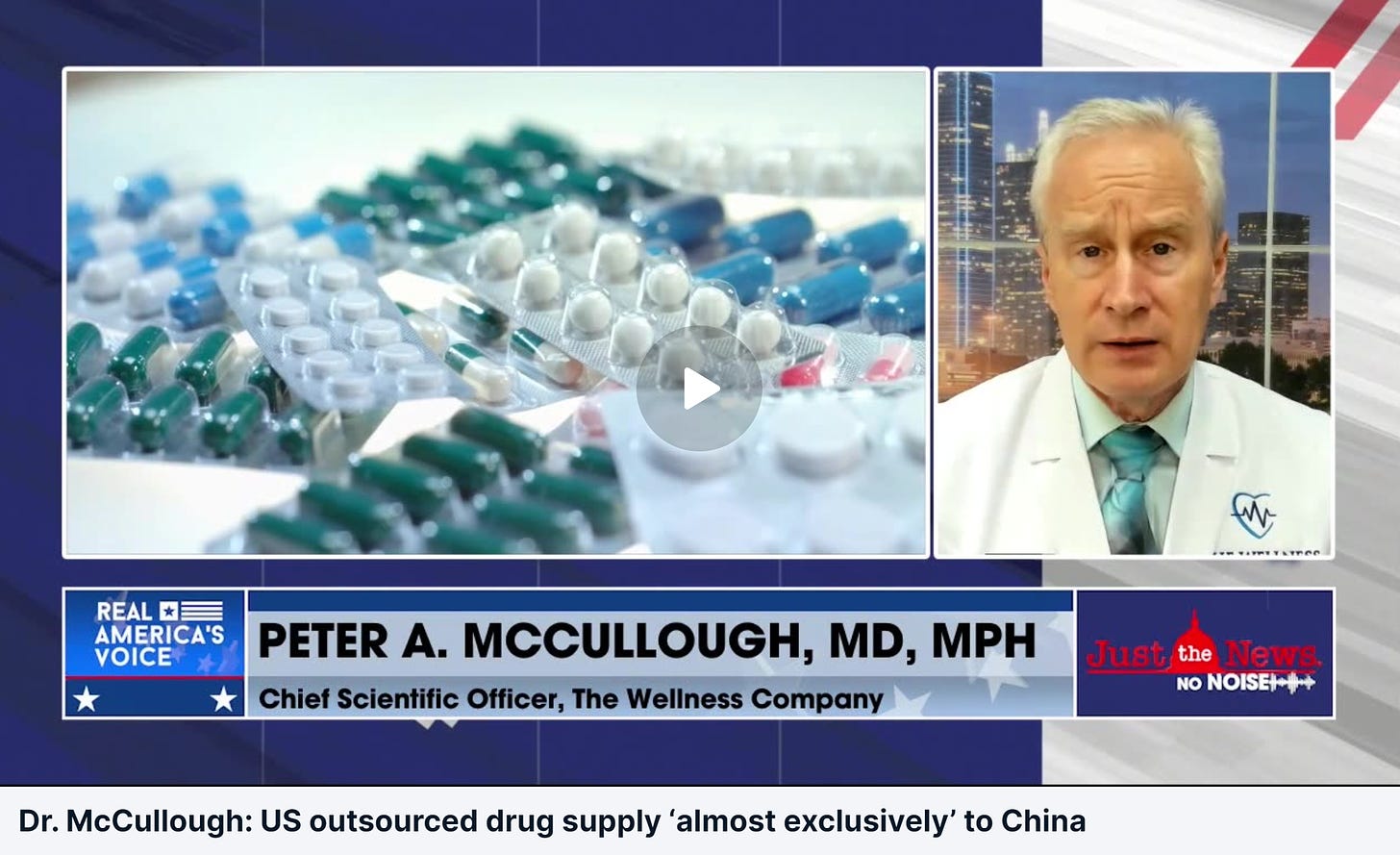Have you ever wondered why there are drug shortages of some of the most commonly used pharmaceuticals like Dilantin, Amoxicillin, and Potassium? The answer is complicated and involves market pressures, group purchasing organizations, and drug ingredient suppliers. For this issue we are fortunate to have one of the world’s experts on this issue, author and scholar, Ms Rosemary Gibson. This is an exclusive long format issue with Gibson, author of China Rx, the most comprehensive and heavily reference book on a looming pharmaceutical crisis at the hands of the Chinese Communist Party. Here is some more about the book: “Millions of Americans are taking prescription drugs made in China and don't know it--and pharmaceutical companies are not eager to tell them. This is a disturbing, well-researched wake-up call for improving the current system of drug supply and manufacturing. Several decades ago, penicillin, vitamin C, and many other prescription and over-the-counter products were manufactured in the United States. But with the rise of globalization, antibiotics, antidepressants, birth control pills, blood pressure medicines, cancer drugs, among many others are made in China and sold in the United States. China's biggest impact on the US drug supply is making essential ingredients for thousands of medicines found in American homes and used in hospital intensive care units and operating rooms. The authors convincingly argue that there are at least two major problems with this scenario. First, it is inherently risky for the United States to become dependent on any one country as a source for vital medicines, especially given the uncertainties of geopolitics. For example, if an altercation in the South China Sea causes military personnel to be wounded, doctors may rely upon medicines with essential ingredients made by the adversary. Second, lapses in safety standards and quality control in Chinese manufacturing are a risk. Citing the concerns of FDA officials and insiders within the pharmaceutical industry, the authors document incidents of illness and death caused by contaminated medications that prompted reform. This probing book examines the implications of our reliance on China on the quality and availability of vital medicines.”
Gibson’s track record as a clinical scholar and author is impressive. “She received the highest honor from American Medical Writers Association for outstanding contributions to reporting on critical health issues in the public interest. She is board chair at Altarum Institute, a non-profit health systems research group in Ann Arbor; board member of the Accreditation Council for Graduate Medical Education and served on the CLER Evaluation Committee to advance patient safety in teaching hospitals. At Robert Wood Johnson Fdn, she architected its $200 million national strategy to establish inpatient palliative care programs that now number 1800, an increase from about 10 in the 1990s, and received the Lifetime Achievement Award from the American Academy of Hospice and Palliative Medicine. She worked with Bill Moyers on the PBS documentary, "On Our Own Terms." She has given presentations at hundreds of hospitals; keynoted meetings of the National Quality Forum, The Joint Commission, AONE, National Council of State Boards of Nursing, Federation of State Medical Boards, National Summit on Overuse held by The Joint Commission and AMA, Society of Critical Care Medicine, among others; was faculty for the Dartmouth Summer Symposium on Quality Improvement and its 2013 "wizard." Her books – China RX, Wall of Silence, Treatment Trap, Battle Over Health Care, Medicare Meltdown - have been reviewed in Publishers Weekly, Washington Post, JAMA, Health Affairs; referenced in proceedings of the U.S. Senate; mentioned in Congressional testimony; noted in the WSJ, NYT, USA Today, Consumer Reports, and Boston Globe, O Magazine, Reader's Digest, US News and World Report, & Modern Healthcare. Wall of Silence was translated into Japanese; the Chinese translation of Treatment Trap won the prestigious Open Book Award from China Times. Rosemary has appeared on Chicago Tonight, WBGH’s Greater Boston, The Doctors, C-Span Book TV.”
Here is an interview I had with John Solomon at Real America’s Voice distilling what I learned from Rosemary Gibson about the dilemma.
Please subscribe to Courageous Discourse as a paying or founder member so we can continue to bring you the truth.
Peter A. McCullough, MD, MPH
President, McCullough Foundation
















Share this post